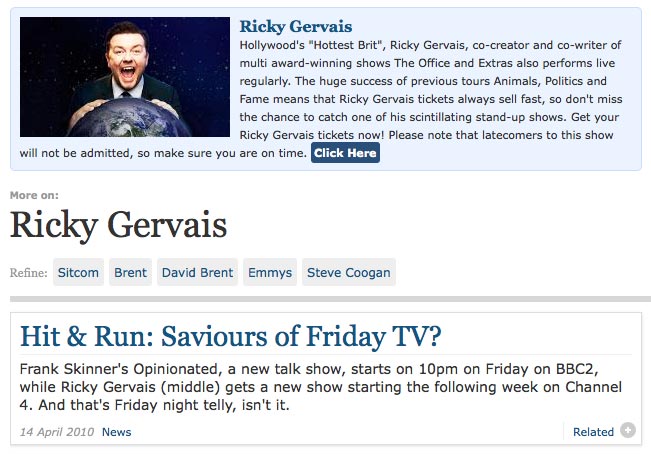Surely what most news organisations have been trying to do since becoming businesses? But as more content and more readers move online, and money from traditionally offline advertisers follows at a slowed pace, there is a disconnection between what news organisations produce online and the opportunities to profit from such expertise and archives, says Andrew Lyons, commercial director of Ultra Knowledge (UKn).
Set up in 2002, UKn is technology company aimed at making online information more usable and more easily accessible. Its technology is already being used by news organisations, including the Metro and Independent, to improve their in-site search engines, providing quickly built topic pages and better access to archives of articles.
For the Independent, UKn created the NewsWall. Launched in January, it provides a new way of organising stories and navigating through them. When a user searches the NewsWall, the results come back as a wall of images representing the articles most recent and most relevant to their keywords. Soon the company will open up the archive of content available through the Independent's NewsWall from two years to the full 23 years of its history.
"The next part will be the ability to save my topic search to my Facebook page and then only have it update when it's relevant to me," Lyons told the recent Digital Storytelling Conference.
As a means of searching the Independent's website, the wall has yet to be brought in as a central navigation tool, rather than an alternative search option. But Lyons is confident that a NewsWall system will be a de facto feature for every major publisher in the next two years.
Work on the Independent's website is ongoing: the technology is being used to create an A-Z directory of topic pages, arranged also by subject area and by how often the term appears in Independent.co.uk content. It is fascinating to see that the BBC is the most referenced company, with 7,962 articles, before a steep drop to Barclays with 1,929 pieces. Creating consistently tagged and organised content has had a positive effect on the site's Google page ranking for the sub-section.
There are also commercial opportunities in creating these topic pages, explains Lyons. Click on a topic page for comedian Ricky Gervais, for example, and alongside related news articles the option to buy tickets to his latest show appears.

These affiliate links make use of existing partnerships the Independent has, but presents them in a more relevant way to readers. Rather than trying to sell tickets and products via generic banner ads, it anticipates what their interest or next action might be in having clicked onto that search keyword, says Lyons.
"We think this is something that publishers have to start to embrace: it's conversational marketing. You can't sit and listen and see what your readers are thinking, but this technology does enable you to follow their interests," he says.
Additionally UKn can now start to produce sponsored NewsWalls around events such as the forthcoming World Cup or general election.
"At least show people what you've got (…) Publishers are sitting on content and on the other side there are search engine optimisation companies and marketers looking for content. Either they should work together or the agencies will get clever and go out and get that content for themselves. Ultraknowledge can help publishers to capitalise on that content by bridging the gap," says Lyons.
Both the NewsWall and such rigorous organisation of topic pages as the Independent's A-Z map allow the news site to act as a trusted guide to introduce readers to new content and commercial streams, he adds. It can also be used to aggregate archived content around historical events and be packaged as a widget for embedding onto third-party sites or social networks.
Paywalls
The plan to help news organisations better organise their sites and make their content more visible to both internal and external searches by readers could be rendered pointless if the trend towards building paywalls continues. While search engines such as Google have introduced tools to accommodate paywalled news, the publishers involved don't have enough say over what content is displayed in search results, says Lyons.
"Publishers don't want to give away all their content, so they only let an abstract be indexed. But the users can't find something if their key word isn't in that abstract. The paywall should be moved in relation to the content being searched for," he explains, creating a "dynamic paywall" that only shows the relevant snippet to that reader's search.
By allowing publishers to set where the paywall falls on a more intelligent basis, if readers want to go further into a site or follow tangents prompted by the topic tags around an article, such as those on the pieces in the Independent's A-Z directory, then they can pay. There's an opportunity to build a micropayment system on top of this, he suggests.
Ukn wants to position itself as an incubator for news organisations, helping them build products using its technology, which has also been deployed at events and conferences to track social media feedback on Twitter and other sites. The company wants to use its technology to challenge how news sites traditionally present and make their content available by focusing on how readers might want to spend their time or, perhaps more significantly, their money - whether that's NewsWalls, paywalls or no walls at all.
Free daily newsletter
If you like our news and feature articles, you can sign up to receive our free daily (Mon-Fri) email newsletter (mobile friendly).
Related articles
- What gets readers to pay? Transparency on the price of journalism
- Futureproofing your newsroom: understand your USP in a crowded space
- Forget about paywall types - your audience comes first
- Behind the scenes of A/B testing: benchmarks and insights from three digital publishers
- Quartz pivots from paywall to registration wall, making the bulk of online content free-to-read









